I came into this series cold: I haven’t played more than a couple hours of any Assassin’s Creed game. One, I played a portion of the tutorial of when I was seeing if PlayStation Now, Sony’s game streaming service, would work with my connection (no). The other, Black Flag, I played until they went back to the “real world” for the first time — also another game I got free somehow. So, I can’t compare this to other Assassin’s Creed games.
I can definitely compare it to other open world RPGs I’ve played recently. At times, I felt like I was playing Red Dead Redemption 2, Horizon Zero Dawn, Rise of the Tomb Raider, but most especially, Ghost of Tsushima. To such a degree that I randomly called my horse “Kaze” or “Kage”.
All screenshots taken from the game played on the PlayStation 5.
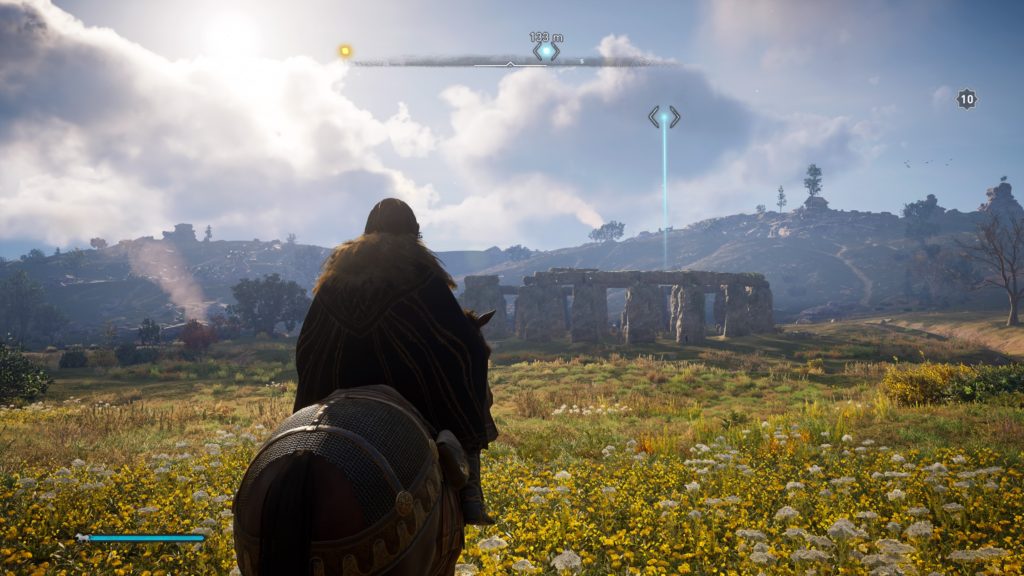
Setting
All Assassin’s Creed games share the meta conceit that the actual “game” is merely a simulation of an earlier person’s life as read out by a bit of handwaving they call “genetic memories”. In previous games, from what I understand, these were the memories of the protagonist’s specific ancestors; in this game, the protagonist is reliving the life of Eivor, a viking whose bones they uncover in a site in New England. The world nearly suffered a catastrophe a dozen years ago; and now the world is once again in danger. Ancient technology saved them once, but now it appears to be killing them.
The implication that the moderns can use their Animus tech to spy on the lives of still living people is not addressed here. The implication that they themselves are a simulation played by we, the real life players, is also not addressed. The question of just how real their Animus simulation is, ALSO not addressed, but I’d like it if it were, because maybe that would explain how the band Prodigy playing Firestarter made it in…
The bulk of the game is set at the beginning of the Norse and Danish invasion of England in the early part of the tenth century. A vanished civilization, the Romans, have left their abandoned roads, walls, temples, and fortresses scattered across the land. (In this game, there was an even earlier vanished civilization, the Isu, that left more subtle marks on the land). The native Saxon tribes have since infested these ruins with their own civilization, largely Christian but with some pockets of an earlier religion that has been melded with Christianity.
Driven from Norway by a unifier king who has no patience for those who will not bend the knee, Eivor and her Raven Clan come to England (specifically; they do not go to Scotland or Wales, though I understand an expansion will bring them to Ireland). They come to join a previous clan, the Ragnar clan, who had sent back stories of a lush, verdant land with a primitive, easily subjugated people.
The reality is different. The Saxon natives are by no means primitive, and were they ever to be united, they could easily drive out the “Danes”. But their own fractured politics keep them warring with each other, and the game then turns to building a foothold in this strange land while forming alliances with, or outright conquering, the far flung shires of the land.
In this game, the Saxons have been infiltrated by “The Order of Ancients”, a secret cabal that has unearthed Isu technology and is using it to gain control of all England (and all the world) from the shadows. Against them are “The Hidden Ones”, whose mission statement is less clear, but nonetheless entangle an always skeptical Eivor in their machinations. While Eivor is mostly concerned with securing their clan a permanent home in Mercia, they will at times find themselves fighting against one or another of these secret societies.
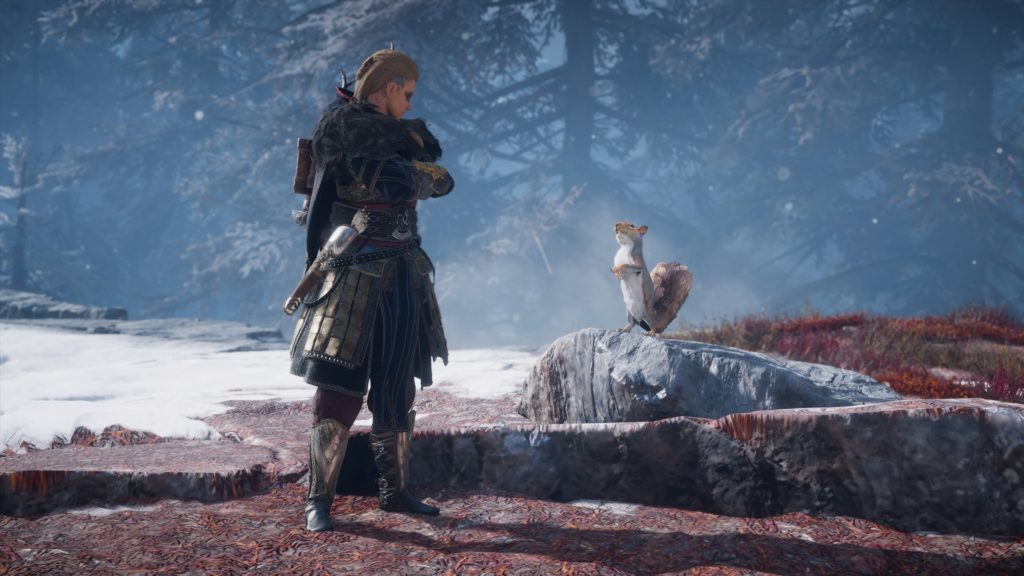
Eivor
Eivor is the surviving child of a Norse jarl who is slaughtered in the prologue. They escape with the aid of Sigurd, the son of a king whom the jarl was hosting, and they are raised as siblings from then on.
At this point, you’re told that there are multiple signals coming from the skeletal bones they have unearthed, and you’re given the choice to focus on one of them, or just whichever happens to be strongest at the time.
You can choose to play as male or female Eivor. If you let the game choose, you will play as female Eivor except during those times when you experience an even earlier life, which you will play as male Eivor. So, canonically, during most of the game, Eivor is female. Your gender is only referred to a couple of times during the game and is never a plot point.
To Eivor and all the Scandinavian invaders, the religion of the Norse is every bit as real and vital as the Christianity of the natives. Dying in battle, with axe in hand, is a mark of a life well fought. Your word, once given, is sacrosanct (unless given to a Christian, where things can be more fluid). Your clan is everything.
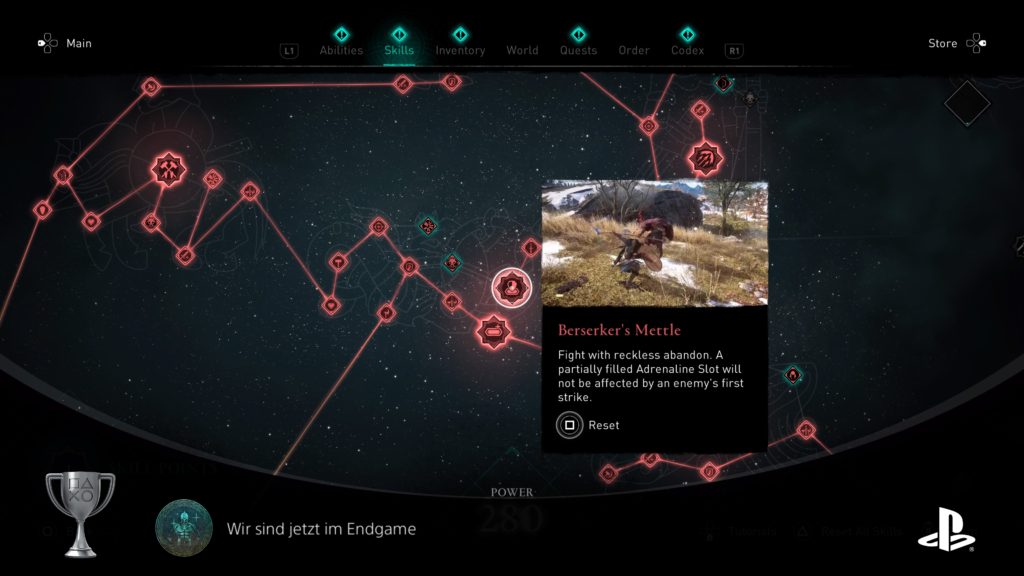
The Gameplay
The game plot has Eivor going from area to area in distinct questlines, of which only one can be played at a time. They are usually tasked with fixing a predicament faced by the ruler of that area (or overthrowing the ruler of that area), in the hopes of forming an alliance that will be called upon in one of the two major battles in the game that split the game roughly in half. Although the questlines take place in a specific area, the player is free to run anywhere in England and take on any of the many, many side activities they find.
Their only barrier is their power level. While their first foothold in Mercia is no trouble to someone fresh off the longship from Norway, stumbling into Wessex would lead to a short, painful death. I’m not sure historical England was split this way, but it does let the game tell its story while still allowing you freedom to explore. Power is gained at a regular pace by buying abilities in the skill tree (shown above). Almost anything you do will gain the XP required, and there’s no grinding necessary.
Aside from completing quests, the following options are available:
- Synchronization Points — usually (but not always) high points on the map, which add other points of interest to your map.
- World Events — little sidequests, which are nearly more fun at times than the actual plot 🙂 These include such things as “Flyting”, iron age rap battles, making offerings to gods, decoding the secrets of standing stones like Stonehenge, fight clubs, secret nudist colonies, witches, treasures of Britain hidden away — so many things. These are where most of your play time will be, unless you’re just following the main plot for some reason and doing no optional content.
- Treasure — resources or gear. Gear is not randomly dropped; most of your gear will be obtained by finding treasure nodes. Armor comes in sets of five pieces, all of which must be obtained to gain a bonus.
- Artifacts — can include Roman treasures or things left behind when the Hidden Ones came to England the first time, with the Romans.
- Raids — these are quick battles where Eivor and their longboat crew (which you get to build) invade an abbey or monastery and steal all their resources for use in building your settlement. These abbeys often contain other treasure and gear and are pretty lucrative.
- Zealots — wandering members of the Order of Ancients who want to kill you. I was able to beat the vast majority of them with One Weird Trick once I got the ability to toss back items thrown or shot at me. Then they patched that out. I was so excited that I’d found an exploit on my own without reading about it. The move still continued to one shot normal enemies and was still pretty effective in certain boss battles.
- Jormvikings — These vikings hang around docks looking for a crew to join. They are sent by other players (and you have one of your own you can dress and send out), and are useful to build out your longboat crew. The game plot will sometimes allow you to have one of your allies join your crew as well. These are enabled by building a Barracks in your settlement.
- Rued quests — these children are in most every town and will give you daily quests which reward Opals, which can be spent on rare gear. You gain Rued in your settlement toward the beginning of the game.
The actual experience of playing the game is nearly identical to that of Ghost of Tsushima or Red Dead Redemption. You find a high point in an area, go to it to add icons to your map, travel to those start a little story or fight someone or solve a puzzle for treasure. It was SO much like other similar games that I was saying to myself as I played, “hey, I remember this from Tomb Raider”, or, “If Sakai were here, he’d just have gotten an achievement”, or, “Arthur Morgan would have liked it here”. So if you liked those other games, you’ll probably like this one, too.
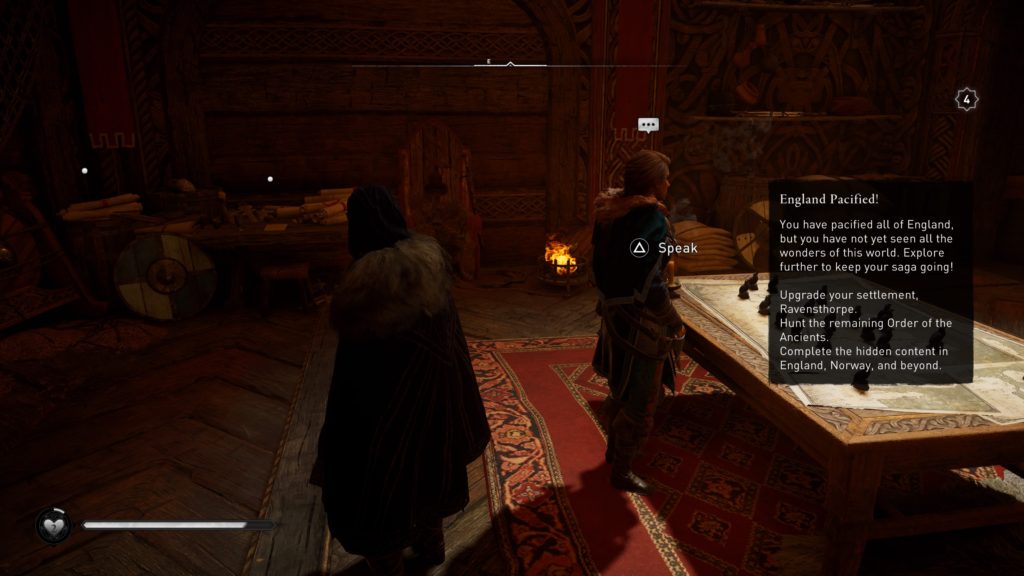
Game Length
I completed the main plot in 127 hours. That included finding almost all the gear in the game, doing a lot of the world events, and doing a lot of exploring. Other people will be faster; howlongtobeat.com says that completing every bit of the map takes the average player about 120 hours. I am nowhere near clearing the map.
Compared to other similar games I’ve played for which I have total playtime and completed:
- Ghost of Tsushima — 66 hours (mostly complete)
- Horizon Zero Dawn — 86 hours (mostly complete)
- Kingdom of Amalur: the Re-Reckoning — 52 hours (including two DLC)
- Greedfall — 53 hours (complete, all endings)
- Death Stranding — 68 hours. (did not strive for completion)
- Red Dead Redemption 2 — I don’t have the exact time for this, but I would expect it to fall around 50-60 hours. I did not finish all the challenges.
Valhalla is by far the longest open world RPG I have played. I spent longer on Octopath Traveller, but that was only because I was being a completionist — I’d finished the main plot well before I finished the game itself.
Since each questline is its own mini-game, the time went by fairly quickly. I’d do a region a night, two on weekends, and enjoyed the self-contained, bite-sized bits of content. If I only had an hour or two, I could spend that tomb raiding. If the game had had your avatar become Lara Croft during the Treasures of Britain runs, I wouldn’t have noticed and it would have been entirely appropriate. There was one in particular that seemed to have been taken entirely, with only minor changes, from Rise of the Tomb Raider.
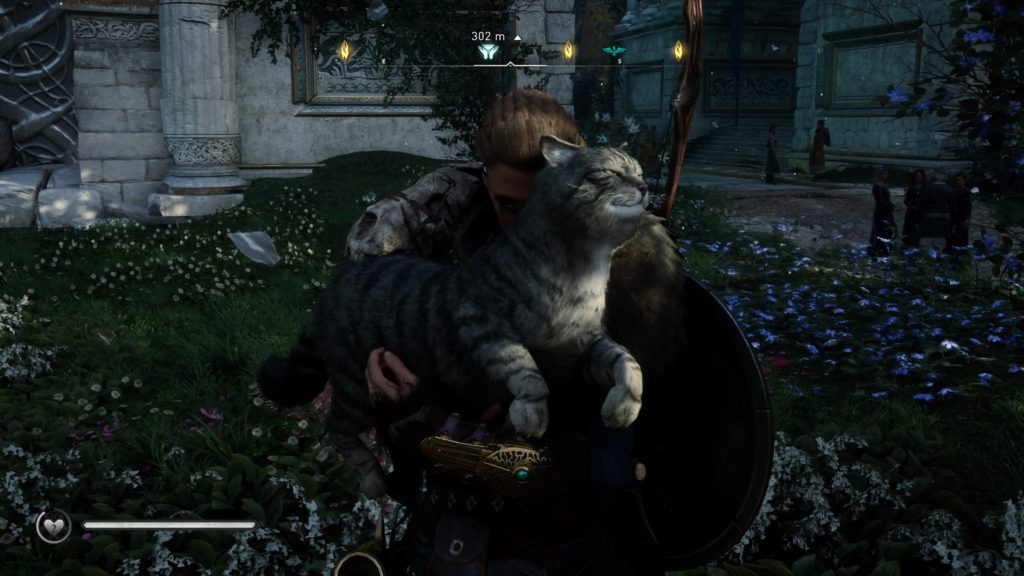
Final Thoughts
I think it would be fair to call ACValhalla more of a platform for smaller games, rather than one cohesive game. It’s not only the largely self-contained bits of content; it’s that the main plot of the game really makes itself known so rarely.
The main plot builds itself to a crescendo where there’s a lot of stuff happening and ancient machines stir to life and your view of the world is turned upside down both to Eivor and to her modern day handler, Layla, and questions of great import are asked and answered and… and then after that, there is more game, and when I finally did get the achievement for finishing the main plot, it seemed like an afterthought. That yawn of a battle — THAT was what I’m leaving the game on? They should have ended the game right when the world was saved (I can’t believe anyone would count that as a spoiler), but I guess they need to leave at a place where they can sell you DLC.
I spent double the time on ACValhalla that I normally spend on these types of games, and I have to admit that I enjoyed most of it and may go back and clear out more of the map. At Eivor’s current power level, just short of 400, there aren’t many fights that will give a challenge, but I have one more witch to kill, one more Order member to fight, many achievements to do, and I imagine the Celts of Ireland and the Britons of France will want to have words with me in the not too distant future.
I wanted to try one new game with my new PlayStation 5. I chose Valhalla and have no regrets. It uses the well-worn open world RPG tropes as a starting point on which to build a game that lends itself well to playing two or three hours a session.
The plot set in the modern world was impenetrable; I had to read up on the plot of other games to learn about the metahistory behind that plot. As mentioned earlier, I found the implications of their technology to be so earth-shattering that I couldn’t understand how the real world characters could be so blasé about it. They can experience anyone’s life — even the lives of those still living. An ancient race really did live on Earth before us. There’s other revelations that would be spoilers for this game.
I’d thought that perhaps the “past” they were viewing was all fictional, and that would explain all the modern references and Easter eggs. It’s clearly a simulation; you can hit the edges of the world without much trouble, and there are glitches in the matrix you can find that provide communication with a mysterious voice from some other reality. The series “Devs” from earlier this year explored a method of looking into the past that struggled with questions of predestiny and how real that past was, but in Valhalla, the question of whether or not this represents the real past of the game is answered definitively, but without looking into those implications.
Has nobody in the modern world portions of the game series ever asked themselves if someone was experiencing THEIR lives?
I read that there is a good ending and a bad ending to this game. There is a point in the game where Eivor’s brother, Sigurd, recounts all the times in the game where you could have submitted to his authority or gone your own way in defiance. As a good subject of my jarl, I always obeyed even when I disagreed, and in this final reckoning, Sigurd was happy with me. I don’t know how the story would have gone if he’d been unhappy with me, but I can’t see it influencing the larger plot one way or the other, but I don’t know.
You are also given the option of romancing his wife, Randvi, during the game. I will leave it to you to decide how that would make Sigurd feel 🙂
Normally, I would have blogged while I was playing the game, but I felt when I did that with Ghost of Tsushima that I spoiled too much. I’ve deliberately avoided spoilers here as best I could. Good luck on your own adventure 🙂
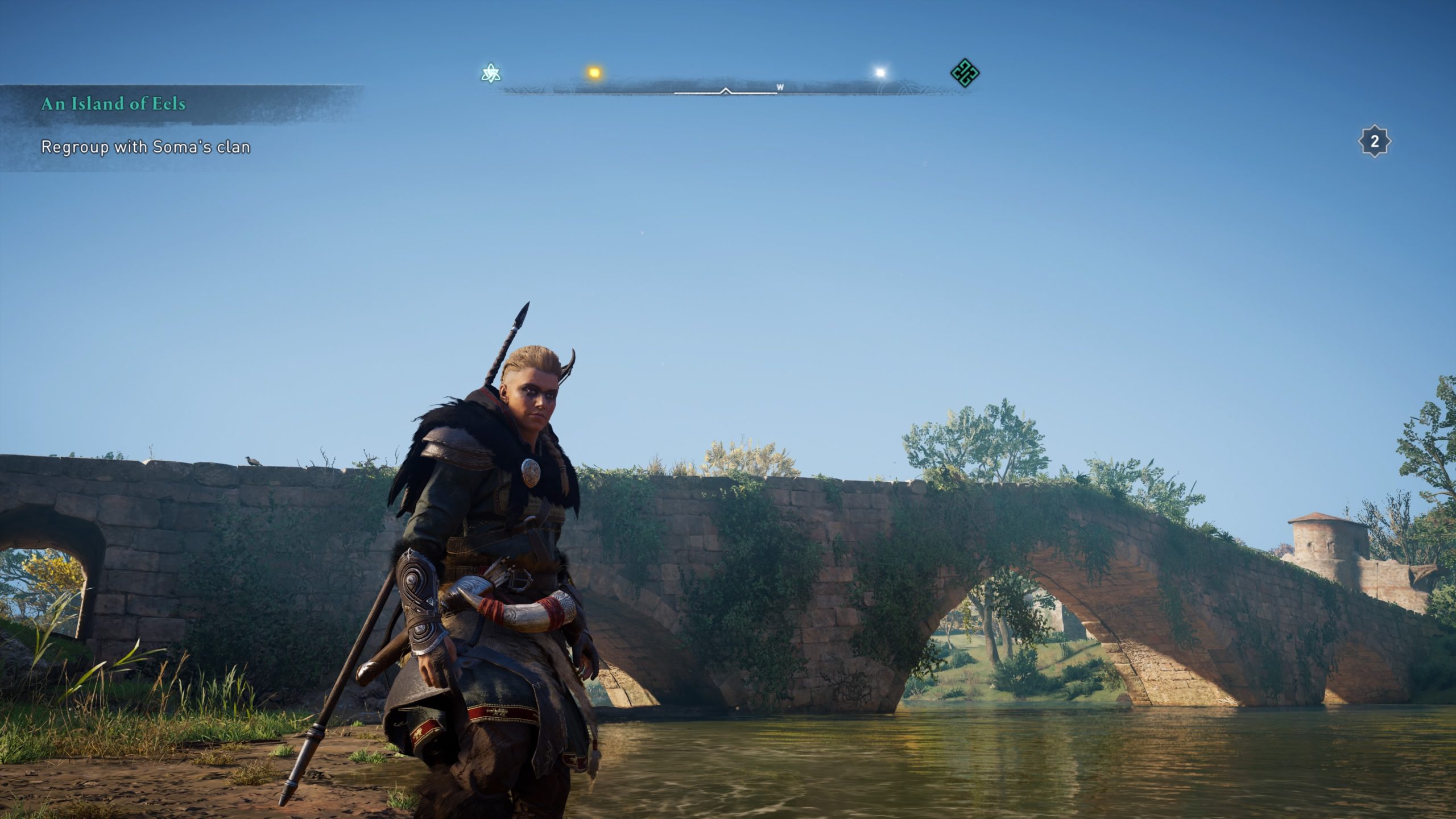
1 thought on “Assassin’s Creed Valhalla: My First Creed (no spoilers)”
Comments are closed.